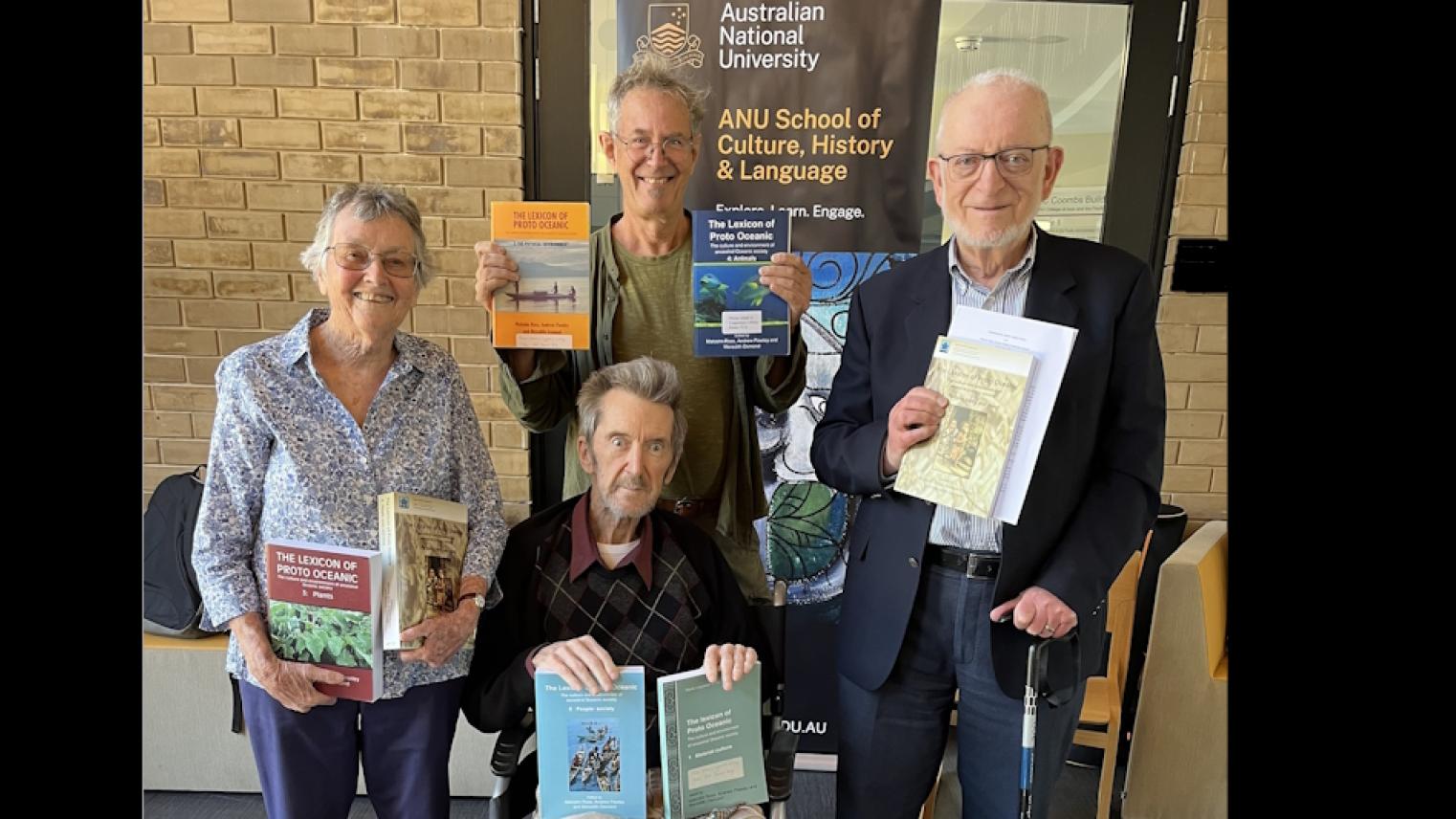Words as a window on the Pacific past

By Dr Bethwyn Evans
How does one find the words to describe the impact of a project that has brought to life the world of an ancient Pacific society through words? Professor Matt Tomlinson, an anthropologist in the ANU School of Culture, History & Language (CHL), chose Fijian words to open the event to celebrate the Oceanic Lexicon Project.
In 1991, Professors Andrew Pawley, Malcolm Ross, and researcher Meredith Osmond, all emeriti of CHL, embarked on an ambitious project to recover the world of the Pacific past through the reconstruction of ancient words. The traces of these ancient words lie in the more than 500 Austronesian languages spoken in eastern New Guinea and the Pacific, all of which are descended from an ancestral language, Proto-Oceanic. And so, it is through the comparison of the lexicons of today’s Oceanic languages that Andy, Malcolm and Meredith were able to recover words used by speakers of Proto-Oceanic, who lived around 3,500 years ago in the Bismarck Archipelago.
The Oceanic Lexicon Project is not just a lexicon of reconstructed words, but an encyclopaedic dictionary of ancient words, their meanings, and what they tell us about the lives and world of the speakers who used them. The fine-grained lexical reconstruction is embedded within perspectives on the Pacific past and present from archaeology, social anthropology, cultural ethnography, biology, meteorology, paleoecology, and shows how much we can learn from today’s Oceanic languages about the people, animals and ecologies of the Pacific.
Now in 2023, we are celebrating the sixth and final volume! Each volume – the first published in 1998 – focuses on a different domain of life:
- Volume 1: Material culture
- Volume 2: Physical environment
- Volume 3: Plants
- Volume 4: Animals
- Volume 5: People – body & mind
- Volume 6: People – society
The volumes bring to life different aspects of the world of Proto-Oceanic speakers: from canoe technology to navigational techniques and meteorological phenomena; from horticultural practices and staple food crops to wild flora; from the taxonomy of animals to creepy-crawlies and their supernatural associations; from the human body to emotions; and from social rank and kinship to settlement patterns and trade.
The Oceanic Lexicon Project has long been part of the fabric of linguistics in CHL, and of the Oceanic linguistics scene. Those of us studying particular Oceanic languages would eagerly work our way through the different chapters to see how they reflected or transformed the words and their uses reconstructed for Proto-Oceanic. Sometimes we were privileged to be able offer up a word and speakers’ use and understanding of it that became key evidence for a Proto-Oceanic reconstruction. The volumes have become a reference on Pacific society for scholars from other disciplines. The published volumes are also a reminder of the passion, insight, and academic rigor that Andy, Malcolm and Meredith bring to the field of historical linguistics and to seeing the Pacific past through the lens of language. And they are a record of many inspiring and enjoyable conversations in the Coombs Tearoom over the last 30-odd years! These volumes will undoubtedly remain a part of the fabric of Pacific scholarship in CHL and beyond for decades to come. As Professor William (Pila) Wilson from the University of Hawai’i at Hilo comments: “The Oceanic Lexicon Project is a hugely important work for scientists working on the prehistory of the Pacific Islands. Furthermore, it is a huge gift to the young people of the Pacific Islands and the diaspora of Pacific Island descendants throughout the world.”
The project is also unique on the world stage; for no other language family has historical linguistics been used to recover such a wealth of knowledge about the past. Associate Professor Simon Greenhill, University of Auckland, sees it as “an amazing historical linguistic project, completely unparalleled anywhere else. It should serve as an exemplar and an inspiration for future historical linguistic work!”
The final volume of the Proto-Oceanic Lexicon Project is not, however, the end. Malcolm, Andy and Meredith are now working with Dr Mae Carroll, a linguist in CHL, to create an online database that brings together the thousands of lexical reconstructions and their reflexes in contemporary Oceanic languages in a readily searchable form and with new ways of visualising comparisons across languages.
All six volumes of the Proto-Oceanic Lexicon Project are available here.